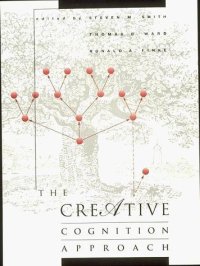
Ebook: The creative cognition approach: edited by Steven M. Smith, Thomas B. Ward, and Ronald A. Finke
Author: Steven M. Smith Thomas B. Ward
Mental processes are the essence of creative endeavor. The Creative Cognition Approach extends this particular view of creativity, first proposed and developed by the editors in their earlier book Creative Cognition, to the programs and theoretical views of some of the most prominent researchers in the areas of problem solving, concept formation, and thinking. Chapters cover a wide range of approaches and processes that play a role in creative cognition, from those that have their roots in associationism (the notion that creative ideas are produced incrementally), to the Gestalt point of view (particularly insight), to current computational approaches. Each chapter deals with central issues in cognition and creativity, and many consider new ways in which creativity can be studied under controlled conditions. The Creative Cognition Approach begins with a new look at an ancient subject, dreams. It then takes up intuition and insight from a contemporary cognitive perspective, and the importance of using prior knowledge in the incremental view of creative problem solving, which is contrasted with the importance of various forms of fixation and sudden insight. Studies are presented that provide new methods for distinguishing insight problem solving from analytic problem solving, and a general description of recall, problem solving, and creative thinking is provided along with relevant experimental evidence. Numerous laboratory studies of creative idea generation are described that reveal the conceptual structures that give rise to imaginative thinking. Visual representations are considered in the context of memory distortions, and in the use of diagrams in scientific discovery. Models that help clarify the relation between comprehension and creativity are discussed, and a novel integration of ideas (primary and secondary process thinking, conditioning, genetic algorithms, chaos theory, the thermodynamics of crystallography) are brought together in a connectionist framework. A multivariate investment approach is used to study creative performance, and criteria for assessing and enhancing creative realism are detailed. A Bradford Book
Download the book The creative cognition approach: edited by Steven M. Smith, Thomas B. Ward, and Ronald A. Finke for free or read online
Continue reading on any device:

Last viewed books
Related books
{related-news}
Comments (0)